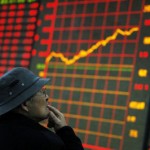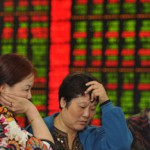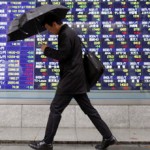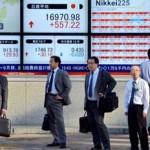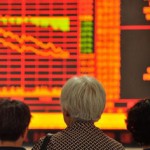Asia markets trade mixed as Nikkei extends losses

Asian markets came under pressure on Friday, despite a positive finish on Wall Street overnight, as a newly weaker dollar brought fresh concerns.
“The U.S. dollar basket has lost 3.2 percent since the close on Friday and 2.3 percent in two days, with Wednesday being the worst single day in (the dollar index) DXY in seven years,” Evan Lucas, market strategist at spreadbetter IG, said in a morning note.
The dollar index, where the dollar is weighted against a basket of currencies, was at 96.58.
Lucas added, “The 36 percent increase in the U.S. dollar in 12 months is clearly putting a strain on U.S. economic growth; U.S. competitiveness has been squeezed and the Fed is isolated as the only central bank to be ‘normalizing’ monetary policy.”
In Japan, the Nikkei extended losses, appearing set for a five-day losing streak, with the index falling 2.15 percent on the back of a stronger yen. The dollar-yen pair fell to the 116-level, trading at 116.63 in afternoon trade; earlier this week, the pair was trading above 120.
Lucas said, “[The Bank of Japan’s] negative rates have done nothing to slow the appreciation of the Japanese yen since last week. (BOJ Governor Haruhiko) Kuroda and Co.’s attempts to drive export competitiveness and more investment diversification from Japan in the current environment is a tough ask.”
Mark Matthews from Bank Julius Baer was more succinct: “Japanese stocks like it when the dollar rises, and don’t like it when the dollar falls,” he said in a morning note.
Japanese exporters were mostly down, with Toyota, Nissan and Honda seeing losses between 2.90 and 3.83 percent.
Down Under, Australia’s ASX 200 closed down 5.65 points, or 0.11 percent, at 4,974.70, with the financial sector losing 0.71 percent. Energy and materials sectors finished in positive territory, buoyed by gains in commodities.
Across the Korean Strait, the Kospi opened down 0.28 percent before retracing losses to trade up 0.13 percent.
In China, indexes gave up their small margin of gains on the final trading day ahead of the Lunar New Year, when markets will remain closed for a week starting February 8. The Shanghai composite retraced gains to trade down 0.21 percent, while the Shenzhen composite traded 0.53 percent lower. Hong Kong’s Hang Seng index was up 0.53 percent.
Mining stocks in Australia ended mixed, with Rio Tinto and BHP Billiton gaining 3.20 and 4.85 percent, respectively, boosted by upticks in commodity prices this week. Smaller miners such as Atlas Iron and BC Iron saw losses of 7.69 and 1.30 percent respectively.
In a note Friday, Goldman Sachs said it expects base metals’ prices could see a near-term rally.
“Against the backdrop of still significant short metals positioning (particularly copper and aluminium), we reiterate that the recent stabilization of the GS China Metals Consumption Index, the upcoming seasonal improvement in metals demand (post Chinese New Year), China State stockpiling, and potential further capacity closures could be catalysts for a short covering rally near term,” Goldman said.
Others are also pointing to a possible continued rally in resources plays.
Matthews from Bank Julius Baer said it is likely the dollar index is heading to the lower-end of the 93-100 range it’s been in since March 2015. “The rally in commodities and emerging markets can continue,” he said, adding, “the vast majority of investors are obviously underweight or short, and those who are short now panicking.”
In Japan, shares of Nikon traded up 4.77 percent, after initially surging as much as 7.47 percent, after the company reported a 28 percent increase in its net profit for April-December period.
Toshiba shares plunged 11.84 percent as the company projected a bigger-than-expected loss in the middle of mounting restructuring costs, following a $1.3 billion account scandal last year. Reports said Toshiba predicted it would record a net loss of 710 billion yen ($6 billion) for the full fiscal year ending in March, up from their initial prediction of 550 billion loss.
In Korea, Kakao shares were down 0.37 percent after see-sawing between gains of 0.91 percent and losses of as much as 1.19 percent. The technology company, which operates South Korea’s dominant mobile messaging app, reported a net profit of 10.2 billion won ($8.6 million) in the fourth quarter, plunging some 80 percent from a year earlier.
With earnings season under way in the region, companies that are set to announce their results today include Nippon Telegraph, Toyota and Sumitomo.
Oil prices remained volatile, after gyrating between declines and gains of 5 to 8 percent this week. U.S. crude futures were flat at $31.74 a barrel in Asian hours, after falling 1.7 percent overnight. Globally traded Brent was down 0.26 percent at $34.37, following a 1.6 percent decline during U.S. trading hours.
Energy plays were mixed, with Australia’s Santos erasing early losses of 3.18 percent to close up 2.23 percent; Woodside Petroleum finished up 0.41 percent. In Japan, Inpex traded up 0.74 percent, while South Korea’s S-Oil retraced losses to gain 0.96 percent. Hong Kong-listed shares of CNOOC were up 1.82 percent, while A-shares of China Oilfield traded flat.
But there could be pressures for the sector ahead if the Fed raises rates, which is likely to push the dollar higher. Loretta Mester, president of the Cleveland Federal Reserve, said overnight that volatility in financial markets as well as deflationary pressures from the plunge in energy prices shouldn’t keep the U.S. central bank from raising rates. Mester is a voting member of the Federal Open Market Committee’s policy panel.
Major indexes on Wall Street closed up, with the Dow Jones industrial average gaining 79.92 points, or 0.49 percent, to 16,416.5. The S&P 500 was up 2.92 points, or 0.15 percent, at 1,915.45, while the Nasdaq composite was higher by 5.32 points, or 0.12 percent, at 4,509.56.
Source: CNBC – Asia markets trade mixed as Nikkei extends losses









